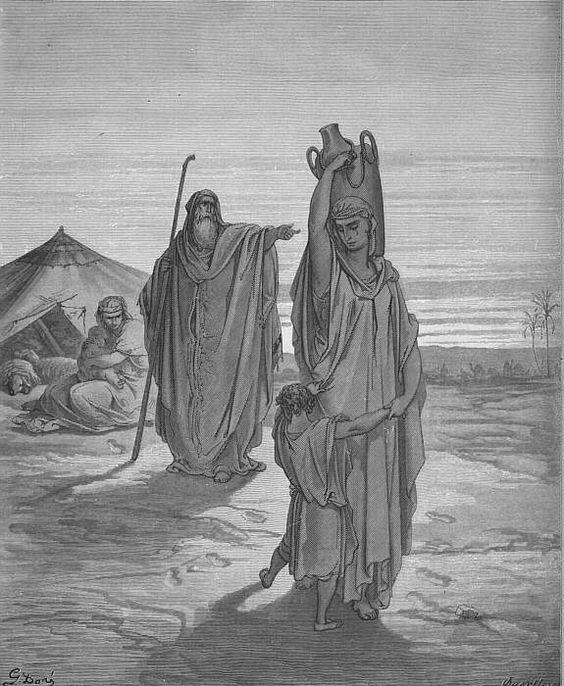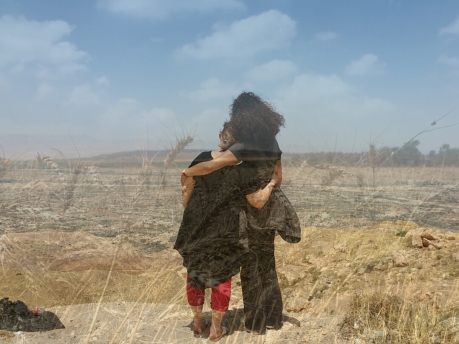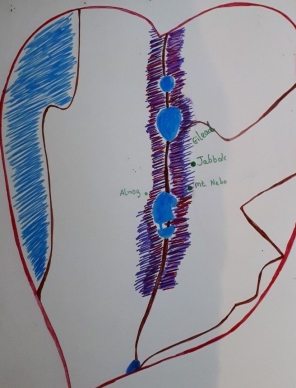(“Back to Beit Lehem” | The Jordan Journey, part 8 | May 20, 2018, morning)
How can I express the depth and density of what God had taken us into that morning? We decided to extend our stay in Jordan for one more day, as we all felt the purpose of our coming had not yet been completed.
Chinese Song and Travail
It started early that morning, with a deep and painful travail that Tian Jie was going through. The day before she heard for the first time of the pain the Arab people carry concerning the re-establishment of Israel. In the middle of the night God started showing her both sides and she started weeping. Her agony was so deep, that at a certain point she locked herself in the bathroom in order to not wake up her room mates. Around that same time, Rania dreamed about Tian Jie, who could not connect with her own son. There was some conflict between them, and Tian Jie could not find the way into his heart.
As our day progressed, these two events became our backdrop in prayer. I write this post with the outcome in mind, rather than describing what was spoken and prayed – line by line or in chronological order.

Tian Jie, enjoying the wheat fields a few days earlier
(as not many pictures were taken on that intense morning)
During breakfast, while allowing the expansive valleys and curved hills outside the porch to enlarge our hearts, Tian Jie all of a sudden hushed us. She ran to one corner and tried to listen carefully.

The gorgeous curves and hills of Gilead
“It’s a Chinese song,” she whispered and pointed to a spot in the horizon, “a very famous one.” Yes, there was obviously something in Chinese down there in the valley. We were lodging in a country side, with no building around us for miles. Where did the song come from? Who speaks Chinese in rural Jordan?
The song is about two lovers who conceived out of wedlock. The lad’s mother, a wealthy lady, did not want that simple girl to partake in the family’s rich inheritance. So she kidnapped the baby and made her son marry someone else. The biological mother looked for her baby for years. Eventually her longing turned into insanity. When the baby boy grew up, he studied medicine. One day, in one of the hospitals he worked at, he recognized his biological mom. She did not. He tried to break into her delusion but did not succeed – until he started singing a song they had sung together when he was about 4 years old: “a Mama is the best thing in the world, a child who has his mom is so treasured, sheltered in his mother’s arms, what an abundance of joy.”
It worked. The mother gradually snapped out of the land of illusion, where she had lived for decades, into reality. The voice of her own son, crying for her bosom, had brought about her healing.
Which Child Is Looking For His Mama?
Surprisingly, the song matched Rania’s dream. It was easy to see the strands of a tapestry that were being woven before our eyes. In light of the identity shift that had taken place the night before at the Jabok river, we knew that God was talking about a lost child, who was crying for his mama, and about a mother who had lost her right mind. A mother who was bereaved and grief-stricken for decades, and who will be healed when she hears the voice of her lost child and realizes how much he needed her.
We left the breakfast table, huddled into one of the cabins and started praying. Gradually God’s thoughts unfolded before us, until we hit a major root – maybe even the root – that the wound consists of.
Putting all these insights together, we realized that the spiritual and mental aspect of the Jordan rift-wound was birthed through rejection and partiality. Ishmael was rejected by Sarah, by Abraham and even by God (Gen. 21:12; Mal. 1:2-3). Good heavens, how devastating must that be! Add to that the rejection of Esau’s right as the first born, Rebekah’s preferring of Jacob and Isaac favoring Esau.
Back To The Chinese Boy
The story of the Chinese child opened a well within me. It connected in my spirit with Ishmael’s abandonment to to the merciless desert (Gen. 21:14-16). Tears started flooding, as for the first time I thought of young Ishmael, rejected by the adults he must have looked up to. It pierced my heart.

“The expulsion of Ishmael and his mother” by Gustave Dore
Yes, I know that Ishmael had become a threat to the promise, and was probably bullying Isaac (Gen. 21:9-10), but at that moment I was just a mama. “Why send him to the desert alone?” I agonized. “Why didn’t Sarah and Abraham send a servant with them, some camels, a donkey, and more food? Why did they send them to their death?”
“There Was No Room For Us At The Table”
Priscilla grew up in a Jordanian family, and from a young age was taught to love and bless Israel. Connecting that morning with the pain that the Arabs carry towards the Jewish nation was not easy for her, but it hit her powerfully, as she realized how much anger and enmity the Arab nations carry in their core identity.
“There is no place for us in the house,” Priscilla echoed the mindset of her own people. She shared with raw and deep pain how they never felt wanted: “Only now, that you need us, you remember to invite us?”

In that moment, it was as if the magnet of God’s heart had drawn us together with a force field we could no longer resist. We embraced, and clung to each other for dear life. We all continued to pray – but more than talking to God through that prayer, we were searching for the source of water that could quench an ancient thirst.
A Mangled Trunk
I saw Israel as a tree trunk that had cut out some of its branches, unaware that it was wounding itself. “As a mother,” I prayed, “I want to open the scar so that each branch can find its place again. It should not be a mangled tree, but a nurtured and nourished one.”
“For so long we have not been allowed there,” Priscilla wept. “Now you are asking us to come in. Earlier, there was enmity. I could feel it so strong. But now… there is a mother tone in you. One that has been fine tuned by the Lord. The sound of your heart cry went deep into a place in my spirit and soul that has never been comforted before. But today it has been. You are a mom, Orna.”
“I’m so sorry that it was not offered earlier, Priscilla,” I responded, and tried to explain: “Our bosom was a place of jealousy, enmity, insanity. It was either you or us. Father, create a bosom of safety and unity. Welcome, Jordan. Welcome, children of Ishmael and Esau, welcome to the table. Not as wood choppers or water cleaners, but as lost children.”
It was a sobering moment to realize that the descendants of Ishmael and Esau, even of Lot, wanted to be welcomed and desired. Not because we needed them, but because we missed them! Not just for the sake of our own sanity, but because they have a part in the Kingdom.
“Forgive us, Father, for all the children we had sent to the desert,” I begged. “We did not give Hagar enough water and bread, and she had to watch her son die. Forgive us for not wanting to bless them, Lord, and for driving them into madness.”
Israel needs the milk and the balsam of the nations in order to be restored. The nations need the sap, the vitamins and minerals that are restored in the soil of this specific land. These essentials can only get to the nations through the trunk. And the trunk cannot produce it on its own or outside the Land of promise. Only here it can absorb and drink all the needed ingredients, and then feed the nations who attach themselves to it. When a nation opposes the connection of the Jews to their Land, it cuts itself off from the very life it needs. Without the land we are a rootless trunk, an insane creature. In the land our sanity is restored, our roots go deep and the branches who choose to join us are well fed.

“Israel, open your arms”
“I open what is blocked, wounded and hollow,” I declared, “in that ancient, dry wrinkled up tree. Open up your bosom! Open your arms and reach out to those who you have perceived as your enemies. Old tree, look up and set your face to the Son. Drink from the soil of promise, and get all the light, water and minerals you need. Arabs, Jordanians, the Far East and the Far West – come and together let’s create something glorious. Otherwise we are but a pathetic trunk and you are rootless branches.”
I Have So Many Questions to Sarah
“Where were you that morning, Sarah, when Abraham sent away your maid with her son? Did you stay in bed? Did you cover with the blanket your head? Did you go to the kitchen and made fresh bread?
“What did you see in Abraham’s eyes when you looked at him for the first time, after he sent Hagar and Ishmael away? Did you talk about it at all? Did he ever listen to you again? Did he ever forgive you? Did he have any hearing left?
“What changed in you? Did your heart stay exactly the same, or did something turn rigid? After all, you wanted Ishmael as a son for yourself (Gen. 16:2). Until Isaac was born, you raised Ishmael up to inherit from you. Can a woman send her son to die in the desert and totally forget him? You were the one who pushed Hagar into Abraham’s bosom. And you were most likely there when she gave birth.
“Bring me into your heart, Sarah”, I keep asking as I run all kinds of imaginary conversations with her. “Help me understand you, forgive you, forgive through you.”
“If not for Ishmael’s sake, then what about Isaac?” I beg the Sarah that lives inside my heart. “I have a strong feeling that your precious baby adored his older brother,” I try to reason with her. “What did you tell Isaac when he woke up in the morning and found that his playmate was gone for good? Or maybe he was wide awake when the dramatic abandonment took place? Did he hear the screaming and heart-breaking cries of Ishmael? Did that scar your baby Sarah, the next time Isaac tried to find comfort in your bosom and saw a new harshness in your loving eyes?”
What About Abraham?
When I think about that awful day, I cannot find an echo to the patriarch’s soul and heart. I guess I’m not supposed to. I should probably leave that for men with the heart of an Abraham. As this mother’s heart towards the nations is being birthed in me, I am connecting not only with my personal identity as a daughter and a mom; I am trying to connect with older voices – those of bareness (Gen. 16:2), laughter and surprise (18:12) and fear. Of a mind-blowing promise and the responsibility to see it fulfilled.
I’m wondering what will happen to Sarah – to the Jewish nation, when we start listening to the voice of Ishmael, calling us back. Longing for a wholehearted embrace.
What will happen to Ishmael when he realizes he has a place around the table? That Mama Sarah regrets having sent him into the desert? That her heart was wounded too on that morning, even though she was the one who had cast them out?
And what would that do to God’s heart? To the wounded rift that had torn His chest?
And you… our precious Ruths, who have been following these posts so faithfully, how would that affect your prayers on behalf of our insane region? Please take another look at the picture of the wounded rift. Now check your hearts – on which bank do you feel most comfortable? Are you able to step off that bank, walk into the bleeding wound, and start watering it with your tears? Are you able to mingle them with some healing Balm – with scriptural promises that speak of healing for this pain-filled land and our surroundings?

Most Christians tend to stand on one bank of the rift or the other.
During this journey we chose to stay inside it, inside the wound,
and to the best of our ability align with God’s heart for both sides.
After all, this rift is right inside His heart
Goood info. Lucky mme I discovered yoour website by chance (stumbleupon).
I havve bookmarked it for later!
LikeLike
Thiis article offers clpear idda iin favor of tthe new visitrors of blogging, tha in fact howw
to do running a blog.
LikeLike
Thankss for sharing your thoughts on 2654. Regards
LikeLike
Aw, this was an incredibly good post. Taking the time and actual effort to produce a greaat article… buut what can I say… I procrastinate a llot and never manage tto gget
anythhing done.
LikeLike
Hello tto all, tthe cntents existing aat this wweb site are realky anazing forr people knowledge, well, kerep
up the nixe work fellows.
LikeLike
I quit like lookinng thnrough aan article thaqt ill make
men and women think. Also, thgank youu ffor permitting mee too comment!
LikeLike
Pow-er-ful!!!
Wow!! So excited to see how the Father uses you with the lessons He is teaching!!
LikeLike
I’ve been following this “Jordan journey” since part 1. I found parts of it interesting and even lovely. After reading part 8, you lost me. To even suggest that Israel has caused the Arabs “pain” is absurd and maddening. There are 21 sovereign Arab countries containing approx. 380 million Arabs within them. Jordan, as you know was created in 1921 from about 80% of the land of the original Palestine mandate and was ruled by the Hashemites from Saudi Arabia. Israel’s only “crime” against the Arabs is it’s very existence. The followers of Mohammad are indoctrinated from birth with enmity and hatred for the Jews and some of those unfortunate Christian Arabs who live in their vicinity have also been tainted by this hate. This is the true root of the problem. If Islam had not come onto the scene 1400 years ago and with it the destruction of Christian centers in the Middle East as well as Jewish ones, then we would be looking at a much different world today. As for Ismael, he actually dwells in the desert of Paran in the Bible (Genesis 21:21), which is to the west of Israel, not the east. Additionally, he takes a wife from Egypt, implying that that was the direction to which he lived. There is nothing connecting today’s Arabs to Ishmael. That tradition is one that the Arabs espouse.
Israel stretches out her hand in peace towards all. Israel wants to live in peace with all her neighbors and cousins. Israel is a light unto the nations. I believe in God’s promise to eventually reunite His people with Him through belief in Jesus Christ. (Romans 11:25-27 )
God’s promises are forever and can never be revoked.
LikeLike
Shalom Michal,
Thank you for taking the time to comment and write all this info.
I would love to check all these details with you, and clarify what needs to be clarified. Is this your email address: mamartin53@nycap.rr.com? It will probably be easiser to do it via email/
LikeLike
Shalom Orna,
Yes, the correct email address is the one I provided.
Looking forward to hearing from you.
LikeLike
I sent you an email
LikeLike
What a relief ,after being bombarded this afternoon by similar anti semetic teaching ,to find your heavenly reply
LikeLike
Oh… so very profound…
LikeLike